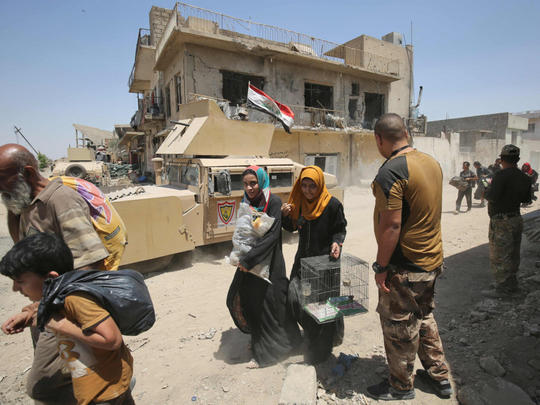
The battle to control north and west Iraq is starting its endgame, and the official Iraqi forces may have started to lose out. They have been totally committed to winning the fight to retake Mosul from Daesh (the self-proclaimed Islamic State of Iraq and the Levant), and large numbers of Iraqi units have been poured into that fight. They have worn down the Daesh fighters so that from the 10,000 that were supposed to be there in Daesh’s heyday, there may be no more than 300 left in the last enclave that Daesh controls in the old city on the west bank of the Tigris today.
But right from the start, the international coalition that is supporting the Iraqi forces in this vital struggle was determined that the Iranian-backed Shiite militias would not be responsible for liberating the largely-Sunni city. When the fighting started in October 2016, the Iraqi forces were supported by their international allies and Kurdish Peshmerga. When they moved into the outskirts of the city in November 2016, they refused to allow the Shiite militias to take a role, fearful that it might lead to similar Sunni political backlash that happened when Iraqi forces worked with the Shiite militias to retake Ramadi in Anbar province to the south.
But the Iranian-backed militias have not sat idle watching their rivals win plaudits for their valour in Mosul. An interesting story in the Guardian by Martin Cholov on June 16, from the minor Iraqi town of Ba’aj, far out in the west near the Syrian border and a few miles south of the main Mosul-Syria highway through Sinjar and Wardiya that was the spine of Daesh’s communications, describes how the Iranian-supported Hashad Shaabi, Popular Mobilisation Front (PMF), has moved in and does not intend to let go as it builds a land route for Iran through Iraq and Syria into Lebanon.
“The transformation of Ba’aj, from an out-of-bounds haven for Daesh leaders to a focal point for Iran’s efforts to change the regional dynamic, is taking place rapidly, even before hundreds of booby-trapped homes have been cleared,” said the Guardian report. “In early May, PMF leaders told their senior members a land corridor that would give Iran a supply line across Iraq and Syria and into Lebanon, had been rerouted south of Mt Sinjar, 25 miles (40km) to the north. Ba’aj was to be the first main hub, and from there the road was to cross into Syria through the city of Deir Al Zour.”
New graffiti on the walls of Ba’aj has replaced Daesh slogans that have been there for two and-a-half years. Ba’aj’s new Iranian occupiers now proclaim “From Mosul to Ba’aj, thank you Sulaimani,” in tribute to Qasim Sulaimani, the Iranian general in charge of the Iranian Quds Force that Iran uses for operations outside its borders. The Iranians have built a large operation inside Iraq, with militias taking orders from Tehran, and political forces running alongside, gathering extraordinary Iranian influence within the Iraqi state. This started during the civil war, following the American occupation, but successive Baghdad governments have never had the will or ability to roll it back.
It is not clear what the Baghdad government can do about this territorial grab for power in Ba’aj. It has not had the military or security reach to enforce its authority in this region of Nineveh province for many years, and has relied on the goodwill of local tribal forces. It was those forces that were persuaded to take part in former United States president George W. Bush’s famous ‘Awakening’ that defeated the insurgency during the American occupation, but it was also those forces that were eventually betrayed by the sectarian policies of the Nouri Al Maliki government, which led them to acquiesce in (if not actively support) the Daesh takeover in 2014.
Just as we do not know what Baghdad thinks of the Iranian land-grab in towns like Ba’aj, we also do not know what the local residents and their leaders think, or how they will react to their new occupiers. After years of living under Saddam Hussain, then the American occupation and the Awakening, followed by the persecution of the Al Maliki government, and then the takeover by Daesh, any one in Ba’aj will have become deeply cautious about speaking their minds, and sharing any of their hopes with anyone outside their own community.
But what is clear is that the long-term re-unification of Iraq under a single authority is a very long way off. If Iraqi Prime Minister Haidar Al Abadi has backed this kind of takeover it shows that he has a far more sectarian agenda than has been obvious so far, and he is imperilling any remaining inclusivity of the Iraqi nation-state, and risks alienating the northern and western Iraqis yet again. But if Al Abadi has not backed this action then it proves that he cannot control the forces running loose in his country, and any progress towards national unity will have to be achieved by tortuous compromises and balancing of local powers, with very uncertain outcome.










